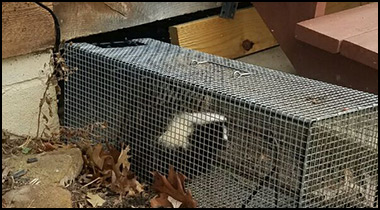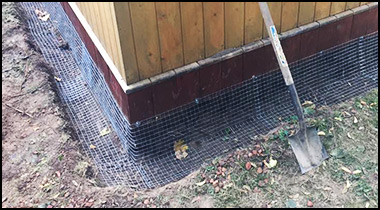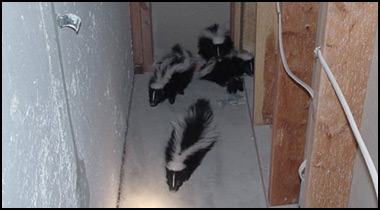Tampa Skunk Removal Resources
Skunk Rehabber - Wildlife Haven Rehab Inc: (813) 792-8511
Free Hillsborough County Animal Services: (813) 744-5660
Humane Wildlife Trappers of Tampa: 813-404-7033
If you need skunk control in Tampa, you have a few options. First, you can attempt to solve the skunk problem yourself by reading our do-it-yourself guide. If you need outside help, you can also call Hillsborough County Animal Services to see if they have any free resources or help for you - however, they primarily deal with dog and cat concerns. You can also call a local Tampa wildlife rehabber, as they are typically a great resource for advice that is in the best welfare of the animal. If as a last resort you must hire a professional company, we recommend Humane Wildlife Trappers of Tampa at 813-404-7033. To learn more about them or check their skunk removal prices, visit tampapestanimal.com.

Tampa Skunk Trapping and Removal

Preventative Repairs & Exclusion

Tampa Skunk Removal From Structures
In many cases, preventative measures can solve your Tampa skunk problem - keep garbage secured, pet food indoors, and most of all when it comes to skunks, secure the perimeter of your shed, porch, deck, or house with a barrier - lattice or steel mesh is good, and it keeps Florida skunks from going under the structure. If trapping and removal of the skunk is the only option you have, please do so with the help of a local agency or professional company who knows how to do it humanely and legally. Browse the resources of this site for more educational information.
Frequently Asked Questions:
Prevention: How to Keep Skunks Away
What to do with a skunk after I catch it?
Is it legal for me to trap a skunk?
How to remove skunk odor
Is a skunk active during the daytime rabid?
What does skunk feces look like?
Tampa Skunk Control Information: Do skunks live in groups or alone?
Stripped skunk is normally solitary animal and this means that it likes to live alone. The skunk can interact with one another in the winter and if it is mating or when the mother takes care of its babies. Adult skunk is a quiet animal while the young will be more playful and makes noise. The biggest types of communication of the skunk are stamping the feet down and this shows that it got upset. There are other noises that a skunk may make and they are squeals, grunts, screeches and hisses or clicking of the teeth.
Skunks tend to be polygamous animal and they breed in the late winter and this is normally in February to march. Normally, a female carries its babies for 75 days. A mother skunk will stay with the babies for 8 months before they move out and live on their own. A male skunk does not stay with the female to raise its kits and some may even end up killing own springs.
For skunk and all wildlife removal in Tampa FL, visit Tampa Pest Animal Removal website to learn more
When a stripped skunk is born, it will look pink and it has faint white and black traces with only some little or sometime no fur at all. The baby is blind and it will not open its eyes and not up to three weeks. Kits produce the musk at the age of eight days and they can go out with the mother when they are eight weeks. Striped skunk will reach sexual maturity when it is one year and this is shows that they can leave alone without the mother. A skunk can reach to two and three years old while in the wild and they will live up ten years while in captivity.
Skunk is a nocturnal animal and this means that it is more active starting at dusk until dawn. After spending days in the den, the skunk will go out during the night to look for food. When the skunk is seen in the day, some people may assume that it is suffering rabies. However, a mother skunk is capable to go out to look for the food for the babies during the day. When a skunk suffers rabies, it will have some signs like stumbling, paralysis, drooling and aggressive behavior. When the winter comes, up to seven females can live together while males may choose to spend the winter on their own but sometime they can board with females. Even if skunks cannot be called true hibernators, in the winter, they will spend much time sleeping
Remember, for free services you can try (813) 792-8511 or (813) 744-5660, but if you need to pay for professional help, check the prices at the tampapestanimal.com website. Or follow our do-it-yourself guide!

